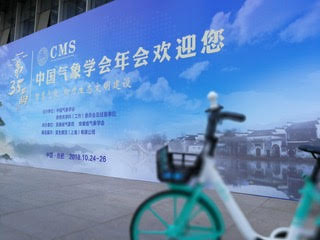
Courtesy of Xuhui Lee
Researchers at Yale are looking to a future where bike-share programs and data collection work hand in hand.
A team of researchers has received a Leitner Award for Uncommon Environmental Collaboration for its proposal to develop bicycle-mounted “smart thermometers” that will be used on Yale’s campus to monitor heat stress in the urban landscape.
The School of Forestry & Environmental Science unveiled the Leitner Awards for Uncommon Environmental Collaboration this February, and the team represents one of the first two groups to receive an award. The awards aim to encourage new research and teaching in six areas: climate change; urban systems and the environment; environmental communications; environmental data science; environmental justice and environmental health; environmental data science and interdisciplinary team teaching, according to the FES website.
The “smart thermometers” project aims to use bicycles — and potentially bike-share programs — to conduct real-time monitoring of heat distributions within urban environments. Faculty from both F&ES and the School of Engineering & Applied Science will work on the project, titled “Measuring Heat Stress of Urban Residents with Smart Thermometers on Bicycles.”
Xuhui Lee, the principal investigator and professor of meteorology at F&ES, said he hopes this data collection will enable researchers to map out the spatial patterns of heat stress in great detail.
“Urban heat islands can be measured from satellites. However, satellites can only measure surface temperature, which is useful for measurements of energy and estimations of energy use. This information is less useful when it comes to human heat exposure and heat stress,” Lee explained. “We’re asking, ‘Why don’t we just try to measure temperature in [a] place where people work and live and use cyclists as data collectors?’”
According to Lee, the “smart thermometers” for the project are still being developed. The team has recently received their first prototype and will now undergo testing to ensure that the thermometer will not only be able to collect measurements as cyclists ride but will also be able to transmit those measurements through a smartphone app.
Once the prototypes are complete, the team will install the “smart thermometers” on public bicycles to measure heat stress of urban residents in New Haven, according to Justin Farrell, another member of the research team and professor of sociology at FES.
He said that the thermometers will then measure outdoor air temperature, geolocate the measurement and transmit the data to specific locations. An algorithm will use these real-time mobile measurements to produce temperature maps of different areas of the city.
The researchers also plan to overlay the temperature data with traditional social and economic predictors of risk to understand how vulnerable certain neighborhoods are to high temperatures, according to Farrell.
Lee noted that these maps could be useful for emergency responders as they prepare for heat waves and aim to prevent mortality related to heat stress.
The projects will be highly interdisciplinary, incorporating work from professors in several departments. Man-Ki Yoon — one of the associate research scientists, along with Jung-Eun Kim, working for Zhong Shao, one of the members of the core team and a computer science professor — said that his role is to lead efforts to develop computing technology for the environmental monitoring.
These efforts will include implementation of the prototype device and development of a smart-sensing algorithm and real-time analytics framework. Farrell, on the other hand, is responsible for incorporating societal and human perspectives into the research.
Lee explained that the team will demo the “smart thermometers” in a city prior to rolling them out on a larger scale. The first city will likely be New Haven or a city in China.
As more and more cities are implementing public bicycle programs and bike shelter installation, there is a huge potential for using bicycles as an environmental monitoring platform, Farrell said in an email to the News. “Successful implementation in one city will lay the foundation for adaptation of this new ‘Internet of Things’ technology by cities across the country. Another broader impact is increased preparedness of an urban community to cope with heat stress.”
The grants were made possible by a gift from James Leitner ’75, a past recipient of the Yale Medal for his service to the Association of Yale Alumni.
Madison Mahoney | madison.mahoney@yale.edu .







